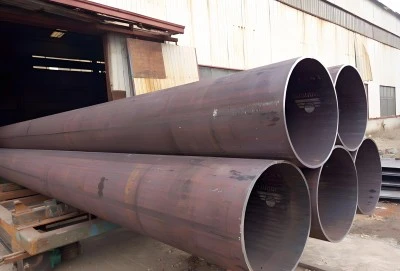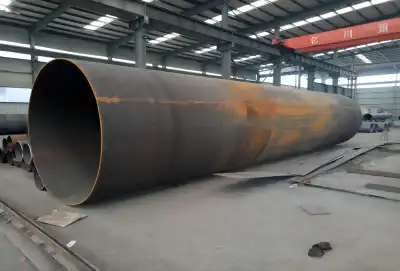In the world of oil and gas transportation, API 5L welded pipe plays a crucial role. These pipes are the backbone of many pipeline systems, ensuring the safe and efficient transport of valuable resources across vast distances.
|
|
|
API 5L Welded Pipe
API 5L welded pipe refers to steel pipes manufactured according to the American Petroleum Institute (API) 5L specification. This standard covers seamless and welded steel line pipes used in pipeline transportation systems in the petroleum and natural gas industries. The "5L" designation specifically pertains to line pipes, while the "welded" aspect indicates that these pipes are formed by welding rather than being seamless.
Various welding methods, including:
- Electric Resistance Welding (ERW)
- Longitudinal Submerged Arc Welding (LSAW)
- Spiral Submerged Arc Welding (SSAW)
Each of these methods has its advantages and is chosen based on the specific requirements of the pipeline project. The welding process creates a strong, continuous seam along the length of the pipe, ensuring its structural integrity and ability to withstand high pressures.
How does API 5L welded pipe compare to seamless pipe?
- Manufacturing Process: Welded pipes are produced by rolling flat steel plates or coils into a cylindrical shape and then joining the edges using a high-frequency electric resistance welding (ERW) or submerged arc welding (SAW) process. This creates a visible seam along the pipe's length, which undergoes rigorous testing to ensure structural integrity. In contrast, seamless pipes are manufactured by heating and piercing a solid steel billet to create a hollow tube, followed by elongation and rolling processes to achieve the desired diameter and thickness. Seamless pipes have no welded joints, which can enhance their uniformity and ability to withstand high pressure.
- Cost-Effectiveness: API 5L welded pipes are typically more cost-effective to produce, particularly in larger diameters. The manufacturing process allows for greater material utilization and higher production efficiency, reducing overall costs. This economic advantage makes welded pipes a preferred choice for large-scale pipeline projects in industries such as oil and gas, water transmission, and structural applications. Conversely, seamless pipes require more intensive processing, leading to higher costs, which may not always be justified unless extreme conditions demand their use.
- Availability: Welded pipes are available in a broader range of sizes, especially in larger diameters, which is essential for long-distance oil and gas transportation projects. Their production process enables manufacturers to produce customized lengths and dimensions, meeting various engineering specifications. Seamless pipes, while available in a wide range of diameters, have more limitations in large-scale production due to the complexities of the extrusion and rolling processes. As a result, welded pipes provide greater flexibility in meeting project-specific requirements.
- Uniformity: Seamless pipes generally offer superior uniformity in wall thickness and roundness since they are formed without welding. This high precision is advantageous in critical applications such as high-pressure fluid transportation, hydraulic systems, and industrial equipment where dimensional accuracy is crucial. However, advancements in welding and manufacturing technologies have greatly improved the uniformity of welded pipes, ensuring they meet stringent industry standards for wall thickness consistency and structural reliability.
- Strength:
Both welded and seamless pipes can meet the same strength requirements specified by API 5L standards. However, welded pipes may historically have been considered weaker at the seam due to potential defects introduced during the welding process. Modern welding techniques, such as automated submerged arc welding (SAW) and high-frequency electric resistance welding (ERW), have significantly improved seam integrity. Additionally, non-destructive testing (NDT) methods, such as ultrasonic and radiographic inspections, ensure that welded pipes meet or even exceed the required strength and durability criteria, making them suitable for demanding industrial and structural applications.
Despite these differences, API 5L welded pipes have proven to be highly reliable and are widely used in the industry. The choice between welded and seamless pipes often comes down to specific project requirements, budget constraints, and the operating conditions of the pipeline.
What are the key applications of API 5L welded pipe?
- Oil and Gas Transportation: The most common use of API 5L welded pipes is in the construction of oil and gas pipelines. These pipes are designed to withstand high pressures and corrosive environments, making them ideal for transporting crude oil, natural gas, and refined petroleum products over long distances.
- Water Supply Systems: Large-diameter API 5L pipes are often used in municipal water supply networks, irrigation systems, and industrial water transportation.
- Petrochemical Plants: These pipes are crucial components in petrochemical facilities, serving as process piping for various chemical compounds and byproducts.
- Power Generation: API 5L welded pipes are used in power plants for steam lines, cooling water systems, and fuel transportation.
- Construction: In the construction industry, these pipes are used as structural elements, particularly in high-rise buildings and large infrastructure projects.
- Mining: The mining sector utilizes API 5L pipes for slurry transportation and dewatering operations.
The versatility of API 5L welded pipes stems from their ability to be manufactured in various grades, each with specific chemical and mechanical properties suited to different applications. This brings us to our next important consideration.
What are the chemical and mechanical properties of API 5L welded pipe?
The chemical and mechanical properties of API 5L welded pipes are carefully controlled to ensure they meet the rigorous demands of their intended applications. These properties vary depending on the grade of the pipe, with common grades including X42, X52, X60, X70, and X80.
Chemical Properties:
The chemical composition of API 5L welded pipes typically includes:
- Carbon (C): 0.05-0.16%
- Manganese (Mn): 0.8-1.7%
- Silicon (Si): 0.15-0.45%
- Phosphorus (P): ≤0.025%
- Sulfur (S): ≤0.015%
Higher grades may also contain small amounts of alloying elements such as nickel, chromium, molybdenum, and vanadium to enhance specific properties.
Mechanical Properties:
The mechanical properties of API 5L pipes are crucial for their performance. Key properties include:
- Yield Strength: Ranges from 241 MPa (35,000 psi) for Grade B to 552 MPa (80,000 psi) for Grade X80
- Tensile Strength: Varies based on grade, typically 10-20% higher than the yield strength
- Elongation: Minimum of 18-22% for most grades
- Charpy V-notch Impact Test: Ensures adequate toughness, especially for low-temperature applications
These properties ensure that API 5L welded pipes can withstand the high pressures, temperature variations, and potential impacts they may encounter during service.
Contact Information
API 5L welded pipes are a cornerstone of modern infrastructure, particularly in the oil and gas industry. Their combination of strength, versatility, and cost-effectiveness makes them an ideal choice for a wide range of applications. From transporting vital resources across continents to supporting the structures of our cities, these pipes play a crucial role in our daily lives.
As technology advances and the demands on our infrastructure grow, the importance of high-quality, reliable piping solutions will only increase. Whether you're planning a major pipeline project or seeking to upgrade your existing systems, considering API 5L pipes could be a step towards more efficient and durable operations.
Are you ready to explore how API 5L pipes can benefit your next project? Don't hesitate to reach out to our team of experts at Longma Group. With our years of experience in manufacturing top-quality steel pipes, we're here to provide you with the guidance and products you need. Contact us today at info@longma-group.com and let's discuss how we can meet your specific requirements with our range of API pipes.














